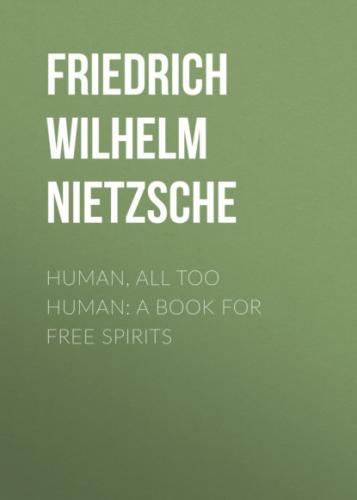PREFACE.
1
It is often enough, and always with great surprise, intimated to me that there is something both ordinary and unusual in all my writings, from the "Birth of Tragedy" to the recently published "Prelude to a Philosophy of the Future": they all contain, I have been told, snares and nets for short sighted birds, and something that is almost a constant, subtle, incitement to an overturning of habitual opinions and of approved customs. What!? Everything is merely—human—all too human? With this exclamation my writings are gone through, not without a certain dread and mistrust of ethic itself and not without a disposition to ask the exponent of evil things if those things be not simply misrepresented. My writings have been termed a school of distrust, still more of disdain: also, and more happily, of courage, audacity even. And in fact, I myself do not believe that anybody ever looked into the world with a distrust as deep as mine, seeming, as I do, not simply the timely advocate of the devil, but, to employ theological terms, an enemy and challenger of God; and whosoever has experienced any of the consequences of such deep distrust, anything of the chills and the agonies of isolation to which such an unqualified difference of standpoint condemns him endowed with it, will also understand how often I must have sought relief and self-forgetfulness from any source—through any object of veneration or enmity, of scientific seriousness or wanton lightness; also why I, when I could not find what I was in need of, had to fashion it for myself, counterfeiting it or imagining it (and what poet or writer has ever done anything else, and what other purpose can all the art in the world possibly have?) That which I always stood most in need of in order to effect my cure and self-recovery was faith, faith enough not to be thus isolated, not to look at life from so singular a point of view—a magic apprehension (in eye and mind) of relationship and equality, a calm confidence in friendship, a blindness, free from suspicion and questioning, to two sidedness; a pleasure in externals, superficialities, the near, the accessible, in all things possessed of color, skin and seeming. Perhaps I could be fairly reproached with much "art" in this regard, many fine counterfeitings; for example, that, wisely or wilfully, I had shut my eyes to Schopenhauer's blind will towards ethic, at a time when I was already clear sighted enough on the subject of ethic; likewise that I had deceived myself concerning Richard Wagner's incurable romanticism, as if it were a beginning and not an end; likewise concerning the Greeks, likewise concerning the Germans and their future—and there may be, perhaps, a long list of such likewises. Granted, however, that all this were true, and with justice urged against me, what does it signify, what can it signify in regard to how much of the self-sustaining capacity, how much of reason and higher protection are embraced in such self-deception?—and how much more falsity is still necessary to me that I may therewith always reassure myself regarding the luxury of my truth. Enough, I still live; and life is not considered now apart from ethic; it will [have] deception; it thrives (lebt) on deception … but am I not beginning to do all over again what I have always done, I, the old immoralist, and bird snarer—talk unmorally, ultramorally, "beyond good and evil"?
2
Thus, then, have I evolved for myself the "free spirits" to whom this discouraging-encouraging work, under the general title "Human, All Too Human," is dedicated. Such "free spirits" do not really exist and never did exist. But I stood in need of them, as I have pointed out, in order that some good might be mixed with my evils (illness, loneliness, strangeness, acedia, incapacity): to serve as gay spirits and comrades, with whom one may talk and laugh when one is disposed to talk and laugh, and whom one may send to the devil when they grow wearisome. They are some compensation for the lack of friends. That such free spirits can possibly exist, that our Europe will yet number among her sons of to-morrow or of the day after to-morrow, such a brilliant and enthusiastic company, alive and palpable and not merely, as in my case, fantasms and imaginary shades, I, myself, can by no means doubt. I see them already coming, slowly, slowly. May it not be that I am doing a little something to expedite their coming when I describe in advance the influences
